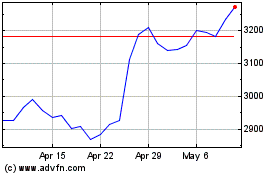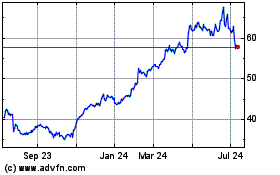FDA Completes Food-Safety Rules
November 13 2015 - 6:00PM
Dow Jones News
The Food and Drug Administration completed long-awaited rules
that give the agency sweeping oversight of the produce industry and
imported foods to help avert foodborne-illness outbreaks.
The regulations issued Friday moved the government closer to
implementing a law passed by Congress in 2010, which marked the
biggest overhaul of federal food-safety oversight in 70 years. The
regulations follow a wave of deadly outbreaks in the past decade
that have been traced to produce—such as tainted spinach,
cantaloupe and caramel apples—and are aimed at creating a
food-safety system that will be less reactive and better at
preventing contamination.
The produce rule for the first time sets federal standards for
how fruits and vegetables are grown, harvested, packed and stored
to reduce contamination risks. Farmers must test the water they use
to raise crops for the presence of potentially harmful bacteria, as
well as take measures such as training workers on health and
hygiene practices and inspecting fields for wildlife
encroachment.
The imported-foods rule enables the FDA for the first time to
hold importers accountable for ensuring their foreign suppliers
meet U.S. safety standards. Food importers must monitor suppliers
through steps such as audits of processing facilities or the
sampling and testing of foods.
"FDA is engaging in regulatory activity where we haven't done it
before," said Michael Taylor, the agency's deputy commissioner for
food and veterinary medicine, in an interview. The rules help
complete the "farm-to-table comprehensive system of
prevention."
Critics of the current system say the FDA often has failed to
take meaningful action until after food contamination has
occurred.
Friday's announcement means just two of the seven major rules
under the 2010 Food Safety Modernization Act still need to be
finalized by the deadline next year.
It is unclear, however, if the FDA will receive all of the
funding the Obama administration says it needs to fully implement
and enforce the law. The FDA has said it requires $260 million,
including $109.5 million for the fiscal year that began Oct. 1.
President Barack Obama requested that amount, but appropriations
bills in both the House and Senate included just $41.5 million and
$45 million, respectively, for fiscal 2016, when all the rules will
be finalized.
The produce rules come as Chipotle Mexican Grill Inc. has
struggled to determine the culprit in an E. coli outbreak that so
far has sickened 50 people in Washington and Oregon, including 14
who have been hospitalized. Public health officials earlier this
month said they hadn't yet been able pinpoint the exact source of
the contamination, but that their investigation indicated
produce.
The FDA's original rule for produce, released in 2013, was
widely criticized by small produce growers, who argued it was
burdensome and could force some to go out of business.
The agency on Friday said the final rule aims to minimize the
risk of harmful contamination while allowing producers more
flexibility.
James Gorny, vice president of food safety for the Produce
Marketing Association, applauded the FDA for instituting what he
called mostly common-sense regulations. Still, he said he remained
worried that the requirement for produce farms to regularly test
water for E. coli bacteria would be disproportionately costly for
smaller growers.
The finalized produce rule goes into effect for larger farms in
about two years, though smaller farms have longer to comply. Some
importers will have to comply with their new regulation 18 months
after the final rule is published in the Federal Register.
According to the produce rule, growers must test their water
supplies—from rivers to groundwater wells—up to 20 times in the
first four years after the rules take effect, depending on the type
of source, and up to five times each year after that. With each
test typically costing $75 to $100, "it's just difficult to
justify" for smaller growers, Mr. Gorny said.
Organic-food growers and distributors welcomed the new rules,
which also ensure that the current practice of spreading raw manure
on organic-food fields up to 90 days before harvest can continue.
The FDA stepped back from an earlier proposal to prohibit
organic-food growers from applying raw manure to crop fields less
than nine months before harvest. Organic growers had rejected the
nine-month proposal, saying it was burdensome and wouldn't enhance
food safety.
Food-safety advocates said the import rule could help guard
against salmonella outbreaks, like one in September in which
imported Mexican cucumbers eventually were linked to more than 700
illnesses and four deaths in the U.S.
Ilan Brat contributed to this article.
Subscribe to WSJ: http://online.wsj.com?mod=djnwires
(END) Dow Jones Newswires
November 13, 2015 17:45 ET (22:45 GMT)
Copyright (c) 2015 Dow Jones & Company, Inc.
Chipotle Mexican Grill (NYSE:CMG)
Historical Stock Chart
From Mar 2024 to Apr 2024

Chipotle Mexican Grill (NYSE:CMG)
Historical Stock Chart
From Apr 2023 to Apr 2024
